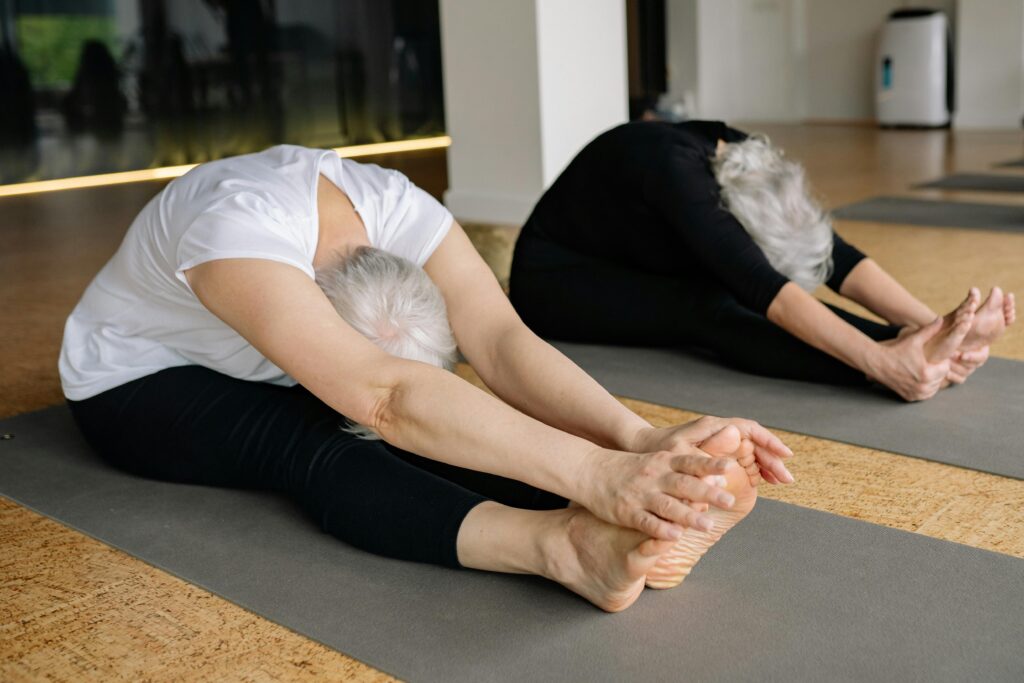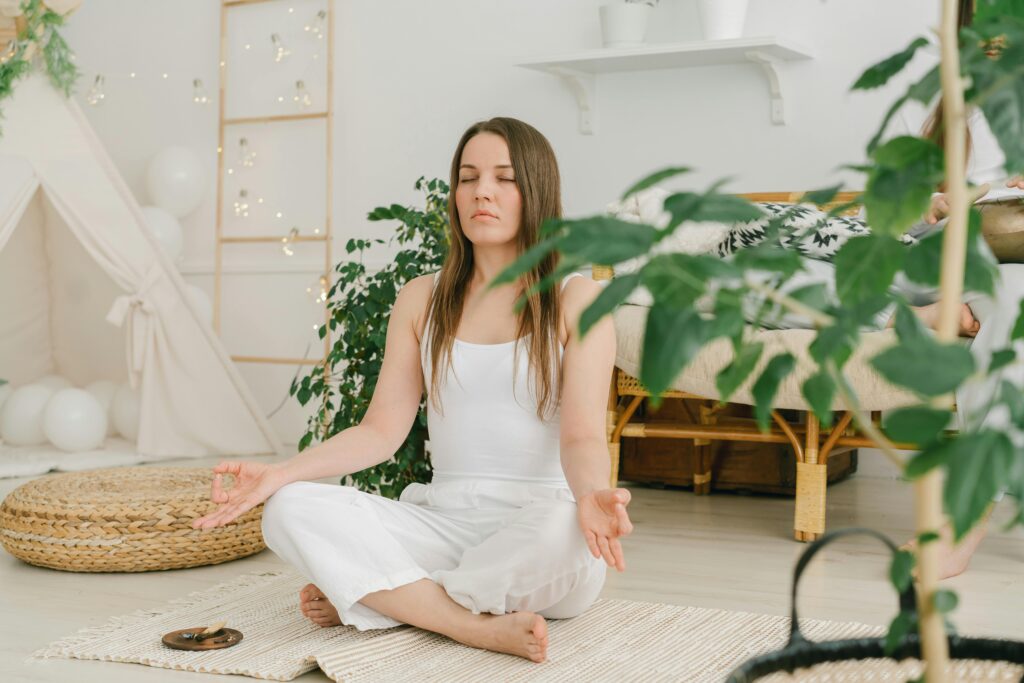Stress and anxiety are now a regular part of our lives since the world moves so quickly. Life can feel like too much when you have to deal with work stress, social media, and all the digital noise. That’s why more and more people are using everyday mindfulness practices to discover serenity and quiet. Being mindful is being aware of the present moment. It helps you relax, pay attention, and be more aware of what you are thinking and feeling. Make your Mind more tranquil and your life healthier by practicing mindfulness every day. Let us look at some basic yet practical daily mindfulness exercises that anyone may undertake, even if they have never done them before.

Start Your Morning with a Mindful Routine
The way you start your day sets the tone for the rest of it. Instead of grabbing your phone right away, try these simple practices to start your day with awareness.
Mindfulness habits for the morning:
Be quiet for five minutes. Breathe in and out.
Stretch your body. Simple yoga stretches or rolling your neck can assist.
Be careful when you drink water. Please pay attention to how it feels, tastes, and smells.
Do not look at screens for the first 30 minutes. Take a rest for your thoughts.
Make a tranquil plan. You could say, “I will stay calm today.”
These little things help you start your day with tranquility and purpose.
How to start your day gently, mindfulness in the morning, and a thoughtful morning routine
Practice Deep Breathing Throughout the Day
We do not have to think about breathing. But if you perform it with awareness, it can be a handy mindfulness tool.
Deep breathing has many benefits:
Reduces stress
Lessens anxiety
Soothes your neurological system
Increases focus
How to Get Better:
Take a deep breath for four seconds.
For four seconds, hold your breath.
Let out your breath slowly for 6 to 8 seconds.
Please do it again for one to two minutes.
Do this anytime you have a break at work or when you feel stressed. It only takes a minute, yet it makes a significant difference.
Eat Mindfully and Enjoy Every Bite
A lot of us eat quickly while we watch TV or look at our phones. Mindful eating helps you take your time, appreciate your food, and not overeat.
How to Eat with Care:
Sit down and don’t do anything else.
Chew slowly and take smaller bites.
Pay attention to the scent, taste, and feel.
Take a break and breathe between bites.
This habit not only benefits your digestion but also makes you feel full and in the moment.
Take Short, Mindful Walks
Walking can be a way to meditate while moving. You do not need any special equipment or a park. Walking around your home or office for a few minutes will help you clear your Mind.
Tips for Mindful Walking:
Please pay attention to how your feet feel when they touch the earth.
Pay attention to the noises, sights, and fragrances around you.
Take deep breaths and stroll.
Put your phone away or leave it in your pocket.
A 5-minute walk can help you feel more grounded and less mentally tired.
Limit Screen Time and Be Present
Spending too much time in front of a screen might make your Mind messy and ruin your peace. It is impossible to stay away from screens completely, but it’s essential to set appropriate limits.
Mindful Screen Habits:
During meals, make it a rule not to use your phone.
Use apps to keep track of how much time you spend on your phone.
Every hour, take a break from screens.
Don’t use your phone before bed.
Instead of scrolling, you may write in a notebook, read, or relax.
Digital detox behaviors, ideas for cutting down on screen time, and phone-free activities for tranquility are some of the things you may do.
Journaling for Self-Awareness and Clarity
Writing down your ideas can help you deal with your feelings, lower your tension, and become more aware of how you are feeling.
Mindful Writing Prompts:
How do I feel right now?
What am I thankful for today?
What ideas are making me anxious?
What do I need to get rid of?
Writing in a journal for 5 to 10 minutes every day will help you feel better emotionally and clear your Mind.
Practice Gratitude Every Day
Gratitude helps you stop thinking about what’s missing and start thinking about what’s already fantastic in your life. It is one of the simplest ways to be happy and more at ease.
Gratitude habits for every day:
List three things you are thankful for.
Thank people and yourself often.
Think of little victories or happy times.
Being thankful changes the way your brain works so that it notices the good things. You feel calmer the more you do it.
Mindful Listening in Conversations
A lot of the time, we listen to respond, not to understand. Mindful listening involves paying complete attention to the other person without judging or getting sidetracked.
Here are some tips for mindful listening:
Look someone in the eye.
Do not talk over me.
Pay complete attention to the speaker.
Say back what you hear.
When you pay attention to what someone is saying, your relationships become deeper and more meaningful.
Use Guided Meditations and Apps
Using an app or audio tutorial might help you get started with mindfulness if you’re new to it. These tools allow you to remain on track and make a habit.
Well-known mindfulness apps:
Headspace is a great place to start.
Calm has sleep stories and strategies for breathing.
Insight Timer has thousands of free meditations.
Smiling Mind is for people of all ages.
Take 5 to 10 minutes every day to listen and clear your Mind.
Establish a nightly routine that helps you relax.
For a peaceful life, you need to get enough sleep. But too much stress and too many screens might make it hard to sleep. A mindful nighttime ritual helps your Mind relax.
Mindfulness habits for the evening:
Stop using devices an hour before bed.
Have a warm shower or bath.
Read a book that makes you feel better.
Take a few deep breaths or do a quick body scan meditation.
Your Mind will appreciate you if you stick to a regular sleep routine.
How to sleep better naturally, a nocturnal regimen for mental tranquility, and sleep and mindfulness are some of the keywords.
Declutter Your Space for a Clearer Mind
Your surroundings show how you feel inside. A space that is free of clutter can help you think more clearly and lower your tension right away.
Tips for Mindful Decluttering:
Clean up one area at a time.
Get rid of things you do not use.
Make sure your work area is tidy.
Use relaxing smells or light candles.
Your Mind follows when your space is calm.
Be Kind to Yourself Daily
Mindfulness is not just about being calm; it’s also about being nice, especially to yourself. There are good and bad times in life. Be kind to yourself.
How to Be Kind to Yourself:
Talk to yourself the way you would to a friend.
Take a break when you need to.
Celebrate minor victories.
Do not judge yourself too harshly for your mistakes.
It is simpler to attain inner peace when you are nice to yourself.
Mindfulness in Everyday Activities
Being mindful doesn’t mean you have to sit still. You may be aware that while you go about your day.
Being aware of everyday moments:
Cleaning the dishes
Showering
Putting away clothes
Giving plants water
Brushing your teeth
Just pay attention to what you are doing, your breath, and your senses. It makes monotonous jobs into calm rituals.
Take Time for Silence and Stillness
There is a lot of noise in the world we live in. Taking time to be quiet helps your Mind refresh and repair.
Ideas for Peaceful Time:
Sit outside and listen to nature.
Sit in silence and light a candle.
Do not do anything for five minutes.
Just be. No goals. Not getting anything done. Just being still.
Conclusion
Make your life more peaceful, one habit at a time. You do not have to change everything in your life right away to get the benefits of being attentive. Start small, with one or two easy habits, and then build on them. A few minutes of mindfulness every day can help you feel calmer, clearer, and happier. Being conscious every day doesn’t mean being perfect. It is about being there for yourself and picking serenity over chaos. So, take a deep breath, choose a habit, and start your calm journey today.


